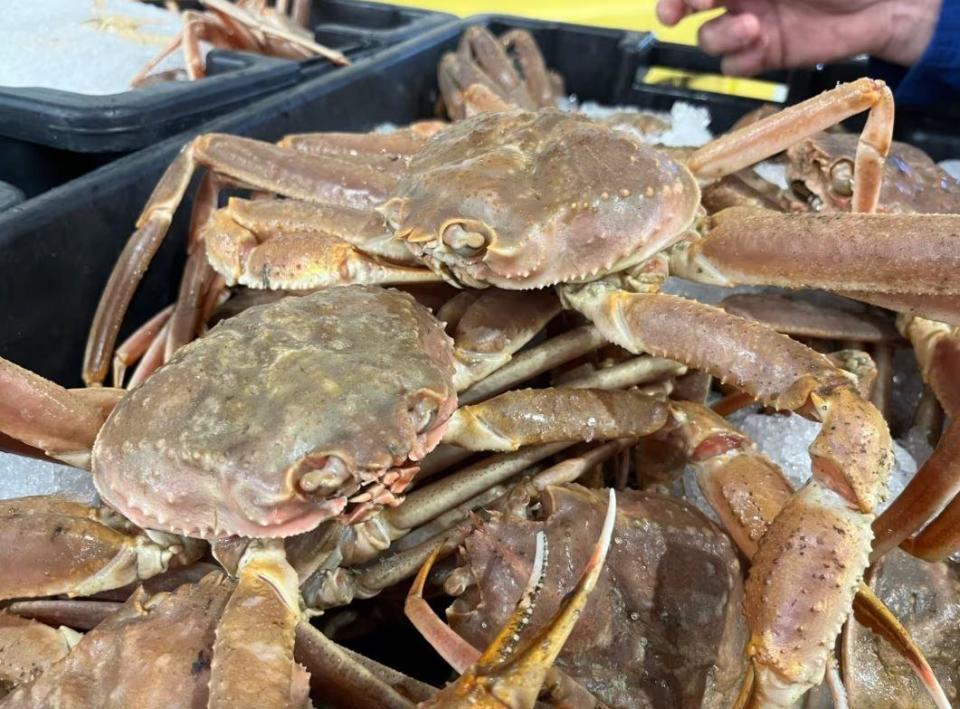N.L. processors dumped 5 times as much crab in 2023 as they did last year


Gerard Chidley, pictured here in 2022, says this year's snow crab catch was among the lowest quality he's seen in 15 years. (Jane Adey/CBC)
Newfoundland and Labrador fish processors dumped more than 300,000 pounds of snow crab during the past season — more than five times the amount dumped last year — according to data from the provincial Department of Fisheries, Forestry and Agriculture.
In 2023, processors dumped 303,202 pounds of crab, compared with 59,239 in 2022 — a 411 per cent increase.
Officials have not confirmed the reasons for the increased dumping, but harvesters blame a compressed season and unusually warmer waters.
Crab harvester Glen Winslow told CBC News the plant he sells to took care to limit the amount of product waiting to be processed so he didn't personally see more dumping this year. But he did notice a number of quality issues that arose from the crab season being pushed into the hottest months of the year.
"The water was a lot warmer this year than in previous years, there's no doubt about that," he said. "It didn't seem like the crab lasted a long while once you took it out of the water."

By the end of August, 300,000 pounds of snow crab had been dumped by N.L. processors, an increase of more than 400 per cent over 2022. (Terry Roberts/CBC)
The 2023 snow crab season was marred with conflict from the outset: a six-week standoff over the $2.20-per-pound price that pushed the start of the season well into May, sending harvesters scrambling to catch what they could before cut-off and creating a bottleneck of boats on the water and product at plants.
A matter of time and temperature
This year's quality issues were not lost on veteran harvester Gerard Chidley.
"[2023] was probably the worst year in quality since 2008 or 2010," said Chidley. "A lot of what was processed was critically weak,'' meaning close to death.
"Critically weak crab left on board a truck would be dead within 24 hours," he said.

Harvester Glen Winslow says waters were noticeably warmer this year. (Kyle Mooney/CBC)
This summer, Chidley said, he often saw as many as seven trucks lined up outside plants with product to process, when he would normally see two or three.
The bottleneck, he reckons, was brought on by the delayed start to the season, which forced inshore and offshore fleets onto the water at the same time. He suspects harvesters stayed out longer to maximize landings.
As for the increased preponderance of critically weak crab, Chidley blames warmer waters.
As CBC News reported in July, Newfoundland recorded the greatest ocean temperature increase in North America this past summer — a phenomenon Chidley experienced first-hand.
"The top 10 feet of water in July and August was about nine or 10 degrees warmer than usual," Chidley said. "The whole ocean was the same temperature. We never see that.
"Taking crab from the two-degree bottom through a 15-degree surface speeds up the dying process.… "If not processed on landing many will be dead."

Fisheries Minister Elvis Loveless says the compressed season resulted in quality issues. (Ted Dillon/CBC)
Many questions, few answers
In a statement, Jeff Loder, president of the Association of Seafood Producers, a network of processing plant operators, didn't explain the increased dumping, but said, "Fishing snow crab in July and August creates significant challenges."
An emailed statement from provincial Fisheries Minister Elvis Loveless likewise didn't address the dumping increase but said, "The compressed season resulted in increased landings and increased fish processing production in order to maximize the remaining time in the season," which in turn led to "the identification of some quality issues."
Loder, Loveless and Fish, Food & Allied Workers-Unifor president Greg Pretty all declined interview requests.
The Newfoundland and Labrador snow crab fishery is the world's largest, according to the FFAW, which represents some 20,000 fish harvesters and plant workers. The union says 2023 was a record year for snow crab landed and processed in the province.
Download our free CBC News app to sign up for push alerts for CBC Newfoundland and Labrador. Click here to visit our landing page.


